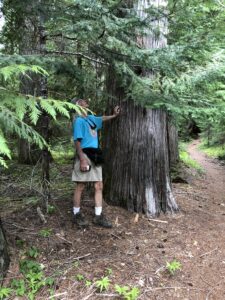
Photo taken by Sue Barnhart with Michael along one of her favorite trails near Eugene OR
We woke up to black smoky air the day after Labor Day 2020. It was challenging to breathe outside, even with a N95 mask. We could not see the sun. The air quality index was over 500, in the extremely hazardous range. Our beautiful Oregon was burning up. The trails we love hiking and the places we love camping in and many families’ homes were burning. All over the state fires were burning out of control, including along a major highway following the McKenzie River, only 10 miles from Eugene, Oregon, where I live. In some cases folks had less than a 15-minute warning to abandon their homes.
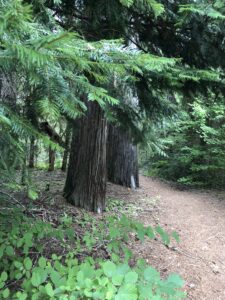
Photo of forest trail by Sue Barnhart
Up until the wildfires happened, though we were in the COVID shutdown, we were able to enjoy hanging out in our yard and taking walks. Suddenly we were confined to our homes. We had to keep all the windows and doors shut and were sharing air filters with friends to keep the air quality livable inside our homes. People without homes were not as lucky as us. Due to the pandemic they weren’t allowed inside public buildings to breathe fresh air, and though a few shelters were open, there was not enough room for everyone who needed shelter from the bad air. We were all scared and glued to the news. We learned the fires might keep burning until the fall rains and winter snow started, and due to global warming the rains might not start for months.
We all packed go bags and had them near our doors or in our cars. We took pictures of family pictures, because there isn’t much room in a car for all the things you might want to save if the fires continued to spread. And we wondered, if we had to evacuate, where would we go? There were traffic jams everywhere as people fled the poor air quality.
We thought of escaping to the coast, where the ocean breeze normally keeps the air clean, but a fire on the coast meant that the air quality wasn’t much better there. Friends who were camping there had to leave.
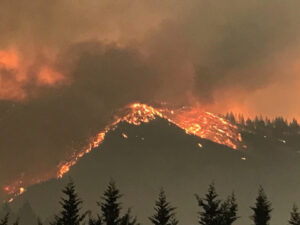
View from highway by Oregon Department of Transportation on Flickr
One friend who lives in the forest woke up to his house surrounded by flames. Knowing he was on an evacuation alert, he had put things near the door that he planned to take if the fire came close to his house. Sure enough, as he slept the winds whipped up the fires. All he was able to do was rush out the door past his collected belongings, jump in his car and drive through raging bright orange and yellow flames and large darting embers from both sides of the road. He made it out. One of the lucky ones, eleven others did not.
Low humidity and unusually high winds from the east fanned fires already started by lightning, campfires and electrical wires blown down by the winds. But the major culprit in this historic wildfire season on the west coast was climate change.
The summer of 2020, an extremely hot, dry one, was precipitated by decades of drought caused by rising world temperatures. The result was massive, sobering destruction in rural Oregon. And what might be the world’s largest emitter of CO2 and therefore the largest driver of climate change? The US military.
Though firefighters worked bravely to put out fires in our beautiful forests and proud rural communities, a bloated military budget funneled off tax money that could have been better spent to hire more firefighters. Many small town fire departments are run by volunteers. Firefighters stationed in every town who are paid a living wage would be a much better use of our taxes.

Eugene, Oregon Tax Day Actions 2021
Now the fires are out and eventually the forests will recover, but many magical hiking trails and camping areas have been destroyed. 4,000 homes were lost in the fires last fall, and Oregon’s homeless population, which is already very large, grew by the thousands. Whole towns burned down all over western Oregon.
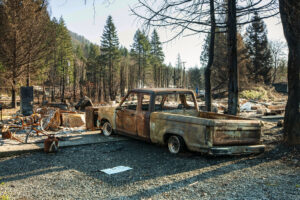
Debris from Oregon wildfire 2020 image from Flickr
Federal and state funds to help people rebuild or relocate are stretched thin. Wouldn’t funds to help all people have a home be a better use of our tax dollars than more funds to the military? But just today I learned that Biden is asking for more than a 6% increase to the military budget.
Spring has come to Oregon, and my yard is green and full of colorful flowers. The fruit trees are blooming and the sky is a brilliant blue. But due to the climate crisis we again did not get enough rain and snow this winter and so far this spring we have had very little rain. I have had to begin watering my garden, something that I never had to do in previous Aprils. We worry when fire season will start this year and how much more of Oregon will be destroyed.
I have been a war tax resister since the 1970’s, since I do not want my money supporting murder. Now I am also a war tax resister because I don’t want my money supporting the biggest contributor to the burning of our planet – the U.S. military. I want my tax dollars to provide for food and homes for all, comprehensive health care that includes dental, hearing, vision and mental health care for all who need it. Free, excellent childcare and education should be provided for all who need it, children and adults. Finally, I want my tax dollars going towards ensuring a sustainable future for our planet, towards real solutions to the climate crisis.
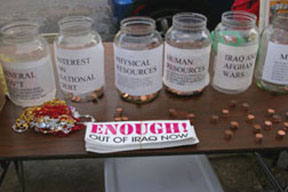
Penny Poll conducted in Eugene OR
Post by Sue Barnhart

Thank you Sue for telling the story of climate change and misplaced governmental priorities in such a personal and clear way. And now, as folks in the Northwest are becoming acculturated to these realities of climate change, we anticipate and plan around “smoke season” and wonder if it will come in June, July, or August this year. It is truly a shame, our collective shame.
Great article, Sue! Thanks for using such salient examples of some ways our tax dollars could and should be used for good instead of for destruction.
Thanks for writing this Earth 🌎 Day reflection. It really brings things home.
Here on the SE coast of the US, in central South Carolina, there has been a fire warning because of dry conditions. OMG the thought of having to evacuate boggles my mind.